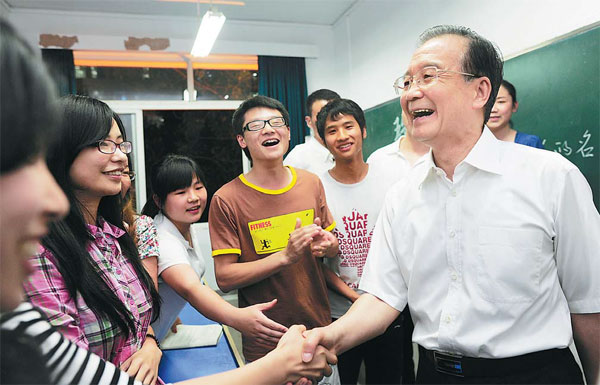Wen urges more support for growth
Updated: 2012-05-21 02:49
By Wei Tian (China Daily)
|
||||||||
|
 |
|
Premier Wen Jiabao, an alumnus of the China University of Geosciences, chats with students at the university in Wuhan on Saturday. During a weekend trip to the industrial city, Wen promised to boost domestic consumption and strengthen Beijing's economic controls. [Zhou Chao/Changjiang Daily/For China Daily] |
Premier focuses on maintaining economic vibrancy in weekend tour
Premier Wen Jiabao called for greater efforts to support growth, through more monetary fine-tuning and fiscal incentives, amid signs of the economy further cooling.
While economic growth is still on track, development will face more complex domestic and global hurdles, Wen said during a weekend inspection tour to Wuhan, capital of Central China's Hubei province.
"The relationship between maintaining growth, adjusting economic structures and managing inflation, must be properly handled," Wen said in comments reported by Xinhua News Agency. "We should continue to implement a proactive fiscal policy and a prudent monetary policy while giving more priority to maintaining growth."
The government, he said, will continue to carry out anticipatory adjustments and fine-tuning, boost domestic consumption and promote steady and relatively fast economic growth.
Wen visited several local enterprises during his visit and exchanged views with company representatives.
Wen's comments came as a series of lower-than-expected economic indicators showed that the economy is facing further downside risks.
Domestic industrial output for April was at its lowest level in nearly two years while retail sales were also the weakest in 14 months, according to the National Bureau of Statistics.
Exports rose by 4.9 percent in April, barely half the rate which economists had forecast, while imports fell far short of expectations. In addition, foreign direct investment slid lower in the first four months of 2012.
To make matters worse, fixed asset investment growth reported its slowest pace in a decade.
"The premier's words came at a vital time, and have sent a strong signal of further policy easing," said Lu Zhengwei, chief economist with the Industrial Bank.
"If the economic slowdown in the first quarter was still acceptable, as part of efforts to tackle inflation, further economic downturn will cause concerns for the authorities," Lu said.
He stressed that although Wen's comments were mostly reiterating previous policies they will undoubtedly help boost confidence in the economy.
Wen said China will continue implementing structural tax cuts and replace sales tax with value-added tax.
Loans to key projects will be increased and credit support boosted for small and medium-sized enterprises, he said.
Banks issued 681.8 billion yuan ($108 billion) in new loans in April, nearly one third less compared to that for the previous month, according to the People's Bank of China.
Although the bank has again cut reserve requirements for lenders in a bid to free up more liquidity in the market, Lu said a key measure would be to increase the loan-to-deposit ratio, the amount of deposits allowed for lending.
A declining deposit base was the main reason for less credit, he said.
But a more effective therapy to tackle a possible economic downturn may still be investment incentives.
The premier has again encouraged more private investors to be involved in monopoly sectors.
Because of a drop in investment in infrastructure and railway projects, these two sectors, need more investment, Lu said.
Less government revenue could be good news for economic reform, as authorities will be forced to give the market more say, Lu said.
However, apart from domestic policy adjustments, "the most severe downside risk for the economy was from external demand," Wang Tao, chief China economist with UBS AG, wrote in a research note.
"The policy easing may lead to a bounce back in business activities in the economy, accompanied with further retreating inflation, which is bullish for the stock market ... but the worsening debt crisis in Europe is adding more pressure to the market in the short term," Wang said.
If the global economy hits a sudden setback, it will result in Chinese GDP falling to 7 percent in 2012, Wang predicted.
Some companies Wen visited are facing difficult business conditions due to weakening demand in developed economies and rising costs at home.
Liu Cunyuan, general manager of Wuhan Haier Electronics, said home appliance sales fell by about 13 percent year-on-year during the first quarter of 2012, as the subsidy program ended.
Xinhua contributed to this story.

 Relief reaches isolated village
Relief reaches isolated village
 Rainfall poses new threats to quake-hit region
Rainfall poses new threats to quake-hit region
 Funerals begin for Boston bombing victims
Funerals begin for Boston bombing victims
 Quake takeaway from China's Air Force
Quake takeaway from China's Air Force
 Obama celebrates young inventors at science fair
Obama celebrates young inventors at science fair
 Earth Day marked around the world
Earth Day marked around the world
 Volunteer team helping students find sense of normalcy
Volunteer team helping students find sense of normalcy
 Ethnic groups quick to join rescue efforts
Ethnic groups quick to join rescue efforts
Most Viewed
Editor's Picks

|

|

|

|

|

|
Today's Top News
Health new priority for quake zone
Xi meets US top military officer
Japan's boats driven out of Diaoyu
China mulls online shopping legislation
Bird flu death toll rises to 22
Putin appoints new ambassador to China
Japanese ships blocked from Diaoyu Islands
Inspired by Guan, more Chinese pick up golf
US Weekly

|

|






